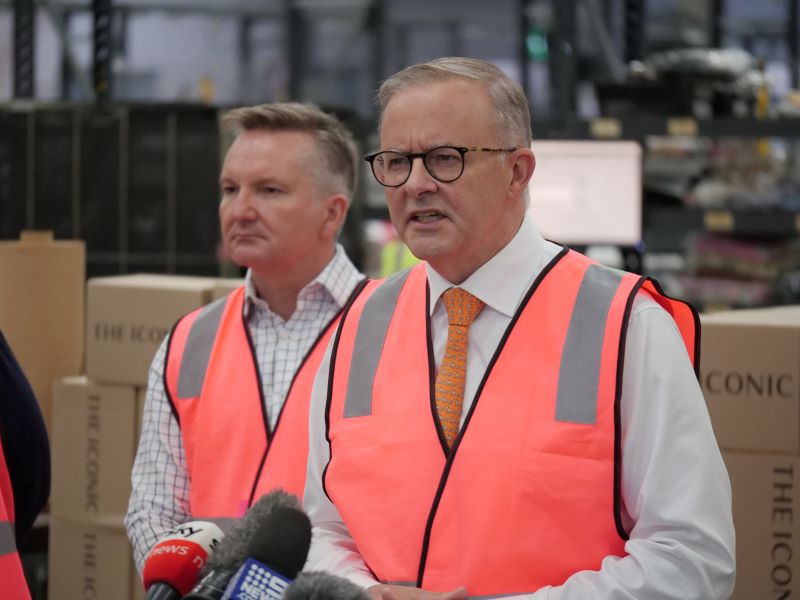Prime Minister Anthony Albanese will retain key critical minerals initiatives announced by the Coalition in March but will reduce the competitive grants on offer and stretch research funding, as the new government looks for savings in next week’s budget.
On Friday, Mr Albanese and Resources minister Madeleine King announced a national strategy will be developed for critical minerals and $100 million will be split evenly between a research hub and a competitive grants program.
Earlier this year, the then-Coalition government released a 2022 Critical Minerals Strategy and announced a $50 million “virtual” research hub as well as a $200 million competitive grants program.
The Coalition initiatives were included in the March Budget, with $250.5 million allocated over five years from 2022-23, with a quarter of the grants controversially dispersed in a “closed round” within one month.
Ahead of next week’s federal budget, the Albanese government has committed to continuing the funding prescribed for the existing grants program while it consults on its “refreshed” Critical Minerals Strategy.

The new Labor government is conducting a “line by line” review of all Coalition spending commitments and has foreshadowed its budget will seek to reign in spending next week.
Labor announced the “new” critical minerals initiatives on Friday to support the sector and Australia’s plan to reach net zero emissions.
“Today’s new initiatives will ensure we can create and support local jobs, diversify global supply chains and meet the growing demand for batteries, electric vehicles and clean energy technology,” Mr Albanese said in a statement.
“These minerals will be critical to Australia achieving net zero emissions, and to helping the rest of the world make that transition as well.”
The initiatives include a National Critical Minerals Strategy to complement the upcoming national plans for batteries and electric vehicles, a research hub, and a competitive grants program.
Both the grants program and the research hub appear similar to the Coalition initiative announced in March, although full details are yet to be released.
Labor’s grants, to be known as the Critical Minerals Development Program, will offer $50 million over three years to early and mid-stage critical minerals projects.
The Coalition’s $200 million critical minerals “Accelerator Initiative” grants program was announced ahead of the March budget. It controversially awarded a quarter of the funds from the five-year program within a month in a “closed round” that only 11 companies were invited to apply for.
Announcements about recipients were then made by the Coalition, including then-Prime Minister Scott Morrison, in the lead up to the election, which the party lost. The new government cleared the grants decisions in September.
The new grants program will build on the $50 million handed out by the Coalition with another $50 million. But it represents an overall reduction of grants for critical minerals, at least until the national strategy is developed.
“The government is continuing the funding prescribed for the grants program while it consults on a refreshed Critical Minerals Strategy, providing industry, experts and the community including First Nation Australians the opportunity to provide their views for the future of the sector,” a spokesperson for Minister King told InnovationAus.com.
The new government is also supporting critical minerals projects with a $1 billion Value Adding in Resources Fund that offers combination of loans, equity, co-investment and guarantees and forms part of its $15 billion National Reconstruction Fund.
Next week’s budget will also include $50.5 million over four years to establish the Australian Critical Minerals Research and Development Hub.
Like the Coalition’s announced research initiative, it will combine expertise from Geoscience Australia, the CSIRO and the Australian Nuclear Science and Technology Organisation working with the critical minerals industry.
The critical minerals research hub funding remains the same at $50.5 million but Labor will stretch the funds an extra year to compared to the Coalition’s three-year research funding.
Geopolitics and increasing demand for the critical minerals needed in clean energy technology and electric vehicle components is a significant opportunity for Australia. Both Labor and the Coalition’s critical minerals support seeks to boost the local sector which is a world leader in extraction but does almost no refinement.
Minister King’s office did not respond to questions on how the new government’s initiatives differ from the Coalition plan or if it represented a reduction in grants prior to publication.
In the earlier statement, Ms King said the package demonstrates the new government’s commitment to net zero and the important role of Australian resources in the global energy transition.
“The new measures will help bring online new sources of supply, support robust supply chains, and create high-paying regional jobs for Australians while improving Australia’s export resilience,” she said.
“Building on the sector by generating new downstream industries and diversifying global supply chains will help Australia and its partners to meet net zero commitments.
Do you know more? Contact James Riley via Email.

